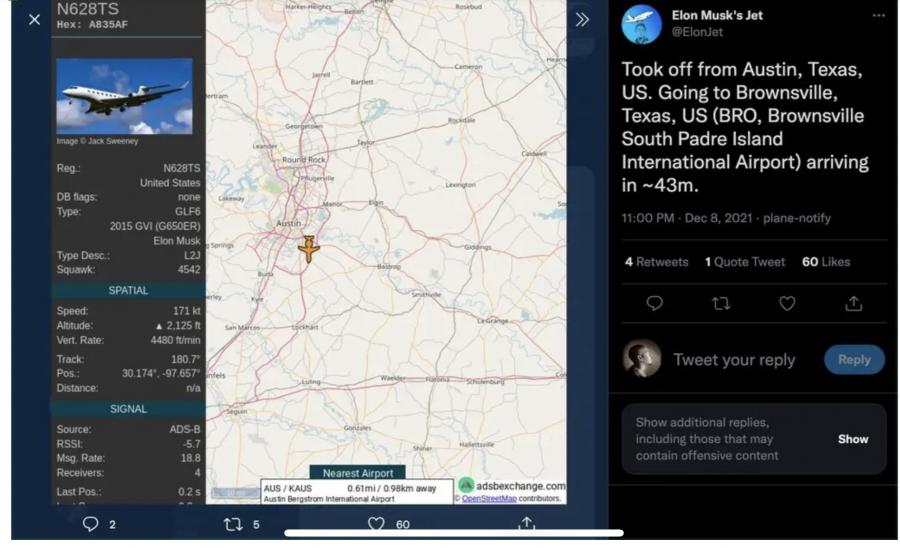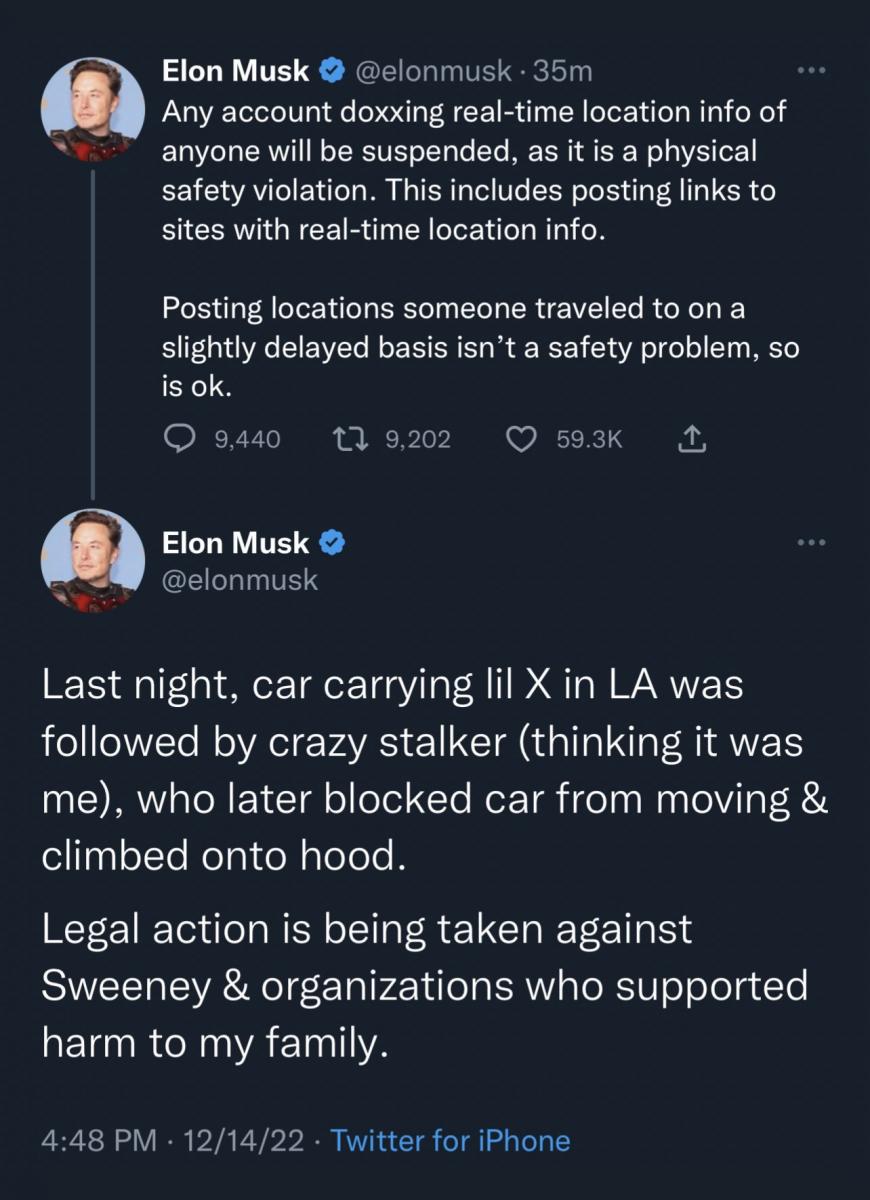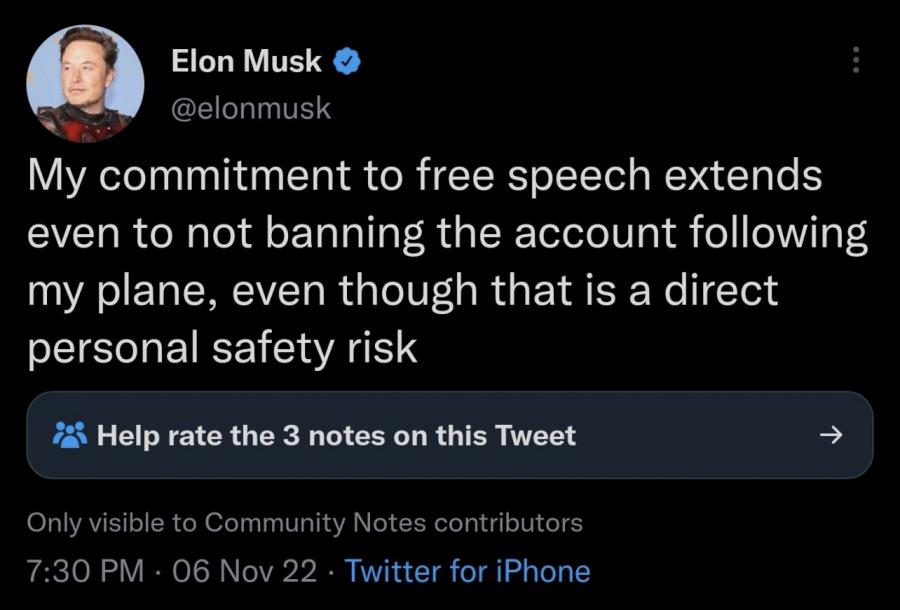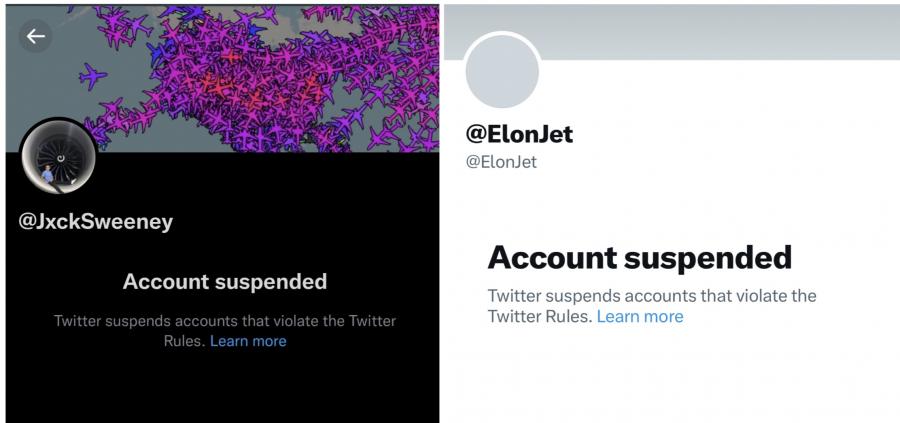
Privacy Concerns On Twitter Regarding Musk's Location
Flight Tracking Elon Musk On Twitter & How This Case Ignited A Discussion On Privacy Matters
Privacy concerns have been of intrinsic value to society for a while. Especially when privacy concerns come up on the Internet. Usually, the cases deal with social media companies abusing users' private information, by publicly exposing their data without their rights (Milmo, 2023). For example, Facebook had to face a fine of 826 million dollars after they had been caught for infringement on their user's information (Milmo, 2023). This information is considered to be private, and social media companies are therefore not allowed to share this without the user's agreement (Milmo, 2023). It was thus clear to Ireland’s privacy regulator to impose a fine on Facebook, which turned out to be the highest penalty ever for violating the European Union’s data protection rules (Milmo, 2023). The case demonstrates an explicit manner in which governments can combat data issues relating to privacy concerns. However, the case of a young social media user who was sharing flight information of a famous celebrity, Elon Musk, has cause for opposing views. This is because it battles issues regarding the freedom of speech and privacy of a public figure.
| Introduction
Elon Musk and his private jet fly around the world to conduct important business deals or other matters. Musk is known for being the owner of Tesla and now Twitter, in which he actively participates in decision-making regarding their regulations and functioning. Musk is therefore considered an important person to the globe and he is also one of the richest people to have ever lived. He has contributed his knowledge and opinions via his social media platform Twitter, which he uses frequently to stay in contact with his followers. Musk is also one of the most followed users on Twitter, which makes him a significant person on the platform. His interaction with his fans is usually controlled and initiated from his accounts.
At the beginning of the year 2022, the Twitter account of 19-year-old Jack Sweeney was shut down for violating Twitter regulations. The Twitter account was called @ElonJet, in which Sweeney chose to expose Musk's flight information (Yang, 2022). He posted all of Musk's jet flight tracking information, without Musk's consent. The account existed since 2020 and was mainly focused on sharing Musk’s jet's current location, by posting flight tracking information on Twitter (The Associated Press, 2022). Musk considered this a privacy concern because he did not consent to share his current location on Twitter with 526,000 people following Sweeney’s account (The Associated Press, 2022). He argued that this was an infringement of his privacy and a danger to his safety (Vigdor, 2022). Consequently, Musk banned the account, because it had violated the rules of Twitter, even though some argued that it was a breach of freedom of speech (Vigdor, 2022). It is also important to note that Musk considers himself a free speech absolutist, which made this ban seem contradictory to what he usually stands for (Milmo, 2022).
The main aim of this research paper is to scrutinize the problems indicated in this case. The paper focuses on privacy matters regarding the case of Elon Musk's jet information being shared. This is because some people view flight tracking to be a necessity for safety, while others consider it a privacy issue. Flight tracking provides a person's current location and future travel plans, which could pose a privacy concern. Especially if the person did not consent to make their flight tracking information data public. However, the objective is to analyse both viewpoints to explain the problems at hand.
First, there will be Westin’s Theory of Privacy (1967) presented to determine the four purposes of privacy. Next, the method section deals with discourse analysis by using Blommert's (2005) definition of multimodality and indexicality. Third, the previous method will be applied to scrutinize the tweets, which include Musk and Sweeney's interaction. In the end, the conclusion will summarise the main points and argue whether this is considered a privacy concern and poses a risk to society if one is exposed to such an extent.
| Background Information
Privacy matters have been part of the public discourse for a while and one of the many pieces of literature that deal with this topic is Chapter 2 titled “Three Theories of Privacy: An Overview” by Stephen T. Margulis. Within this chapter, Margulis (2003) presented a vital theory that could possibly be considered complementary to the case of Musk. This theory is by Wesitn (1967), which deals with the understanding of public and private (Margulis, 2003).
According to Westin’s Theory of Privacy (1967), privacy is determined by each person. However, he was able to summarize the chief purposes of privacy into four core dimensions: solitude, intimacy, anonymity, and reserve (Margulis, 2003). These four core concepts are explained in the following, and aid to define states of privacy according to Westin’s Theory of Privacy (Margulis, 2003).
The first concept, solitude, deals with an individual's autonomy to determine if they want to be alone and free from surveillance (Margulis, 2003). This means that it focuses on the vital aspects of a person's freedom to reflect, introspect and to be able to freely retreat from the public sphere. The second concept is intimacy, which concerns a person's relationships (Margulis, 2003). Their personal relationships regarding development and maintenance of it, should not suffer from external interference or surveillance. The third concept, anonymity concerns the person's right to be able to choose their engagement in certain activities (Margulis, 2003). This concept argues that a person can be part of the public discourse without disclosing their identity.
Westin continues to explain that these four core dimensions of the state of privacy do not guarantee an absolute right, which means that there is a need to balance out what a person needs and what society requires to function in harmony (Margulis, 2003). However, Westin’s Theory of Privacy has impacted the globe, because the chief ideas have been incorporated into contemporary privacy legislation and policy-making (Margulis, 2003). The notions of these four concepts have contributed to protecting individuals' privacy rights, especially during the increasing developments in the digital age. These concepts exist to shed light on how society is supposed to function with the omnipresent information sharing and surveillance.
Also in the case of Musk, it is vital to consider if Musk is right to ban the account of Sweeney. This is because Sweeney has shared information about Musk without his consent on a public platform. The privacy of a person should be spared, especially in the digital age where information can be shared faster and more consistently than ever before. However, it is also critical to consider the fact that Musk is a celebrity, which means to some people that his life is public and they have a right to know more about him than others. This issue is therefore complex because the power dynamics at play are intertwined without there being a clear outcome.
| Analysis: Multimodality & Indexicality
Multimodality and Indexicality are notions that offer congruous analysis. It aids in defining the distinct modes of Musk and Sweeney's tweets. There are metadata, text and uptake metrics to be taken into account. It is vital to examine the meaning that comes about in social life and how it interacts with each other in order for the application of a multimodal approach to be successful. In this sense, the multiple modalities are considered through this analytical method. In this research paper multimodality is an instrument that aids in explaining and rationalising the qualitative data presented here, which is embodied in textual modality (Juffermans, 2013).
In addition, there is a social context illustrated within this analysis. Another tool that is presented here is Indexicality. Through this instrument, multimodality can be approached. This is because the objective remains to comprehend the social meaning of the examined data, the social roles, norms and identities (Blommaert, 2005). The semiotic signs indicate these objectives, which suggest the meaning that transpires through text-context relations (Blommaert, 2005). Overall, the semiotic units point to -index- further than just the denotational meaning.
| Discussion: Sweeney's and Musk's Tweets
The tweets consist of Musk and Sweeney's interaction, but also tweets that demonstrate how the story transpired. The narrative between Musk and Sweeney involved a large crowd because Musk is one of the most followed people on Twitter and the owner of the platform. This means that his input has a much larger outcome than it would if it had been any other celebrity. It is, as well, important to analyse the initial problem, that Musk is a celebrity and his life is consistently played out on a public platform.
He makes headlines for all sorts of things, which others would consider keeping private. In this sense, it becomes harder to evaluate if in this case Musk’s privacy should be protected, because of his publicity. Musk also chooses to address his issues including his opinion on social media. But he always chooses Twitter as his main source to express himself, even before he owned the platform. So when his flights are tracked and this information is shared with 526,000 Twitter users, it becomes difficult to consider it absolute violence of privacy even though he had evaluated it as a safety issue. In the following discussion, this complex issue will be highlighted by displaying a few tweets that demonstrate the problems at hand.
Their interaction kicked off due to Sweeney's post on the platform. He chose to share Musk's flight information by constantly tracking his private jet and consequently exposing Musk's current location. Musk had never consented to Sweeney exposing his location, but that is because there is no explicit regulation that would protect Musk from that. The Twitter account referred to as @ElonJet by Sweeney, was filled with posts illustrated in Figure 1.

Sweeney’s posts were for Musk problematic. This is because he considered it to be a safety issue. He argued that it is an immense problem to showcase his current location, especially for his family's sake. He was worried that this might cause other people to harm him or his family members. In Figure 2, Musk warns Sweeney and others of the danger of sharing a person's current location, specifically if they are celebrities. He, therefore, considered this to be a violation of his freedom of privacy for his safety.

Musk tends to consider himself a free speech absolutist, which made it seems as if he is trying to save Twitter from polarization, by protecting speech and banning fewer accounts. This was one of his main initial reasons for purchasing the social media platform Twitter. However, as time went on and Musk was confronted with different cases that are in line with free speech, it had become more problematic for him to continue his notions. This is because it seems as if he believes that free speech should exist as long as it does not interfere with his life (Figure 3). Or the way he puts it, free speech can exist as long as it does not concern his privacy or safety. The problem with his controversial approach is that it does not leave much room for a person such as Sweeney to figure out what is too much sharing if there are no concrete measurements. This might be one of the reasons Sweeney’s Twitter account was banned, even though some might have viewed his actions as not violating someone's privacy (Ling, 2022).

At the beginning of 2022, Musk considered the account to have violated the rules of Twitter. As a result of that Twitter suspended the account of Sweeney (Vigdor, 2022). In Figure 4, both accounts owned by Sweeney were suspended, which includes his private account on the left and his account where he shared Musk's private jet tracking information, on the right.

Musk's controversial approach to handling this situation has ignited a discussion on privacy matters because Twitter users and others beyond the platform could not agree. Overall the problem indicates that some people think that flight tracking is necessary while others view it as a privacy issue (Ling, 2022).
| Conclusion
Flight tracking is considered to a certain extent a privacy concern. This is because no one would feel safe if others knew their location or travel plans, which on this scale could be considered detrimental to a person like Musk (Vigdor, 2022). However, there were some people who argued against Musk suspending Sweeney's Twitter account. They had mainly stated that Musk was not right because he was limiting freedom of speech. This would make it a contradicting approach for Musk to ban Sweeney.
In conclusion, the issue presented here in this research paper aims at scrutinizing the privacy concerns in the digital realm. It will remain a complex matter because evaluating what is right or wrong seems misleading. Even regulations and other directives are unable to come up with concrete solutions on this matter. In this case, it is plausible to consider Musk banning Sweeney was necessary to keep him safe. However, privacy concerns will continue to increase as long as social media platforms are growing.
| References
Blommaert, J. (2005). Discourse: A critical introduction. Cambridge University Press.
Juffermans, K. (2013). Multimodality and audiences: local languaging in the Gambian linguistic landscape. Sociolinguistic Studies, 6(2), 259–284.
The Associated Press. (2022, December 15). Twitter has changed its rules over the account tracking Elon Musk’s private jet. NPR. https://www.npr.org/2022/12/14/1142967190/twitter-elon-musks-private-jet
Ling, J. (2022, December 20). Elon Musk and the Dangers of Censoring Real-Time Flight Trackers. WIRED. https://www.wired.com/story/elon-musk-elonjet-flight-tracker-transparency/
Milmo, D. (2022, April 14). How ‘free speech absolutist’ Elon Musk would transform Twitter. The Guardian. https://www.theguardian.com/technology/2022/apr/14/how-free-speech-absol...
Milmo, D. (2023, May 21). Facebook to be fined £648m for mishandling user information. The Guardian. https://www.theguardian.com/technology/2023/may/21/facebook-to-be-fined-...
Margulis, S. (2003). Three Theories of Privacy: An Overview. Journal of Social Issues.
Vigdor, N. (2022, February 4). A Teenager Tracked Elon Musk’s Jet on Twitter. Then Came the Direct Message. The New York Times. https://www.nytimes.com/2022/02/03/technology/elon-musk-jet-tracking.html
Yang, M. (2022, December 15). Twitter suspends account monitoring Elon Musk’s flight paths. Twitter | the Guardian. https://amp.theguardian.com/technology/2022/dec/14/twitter-elon-musk-pri...